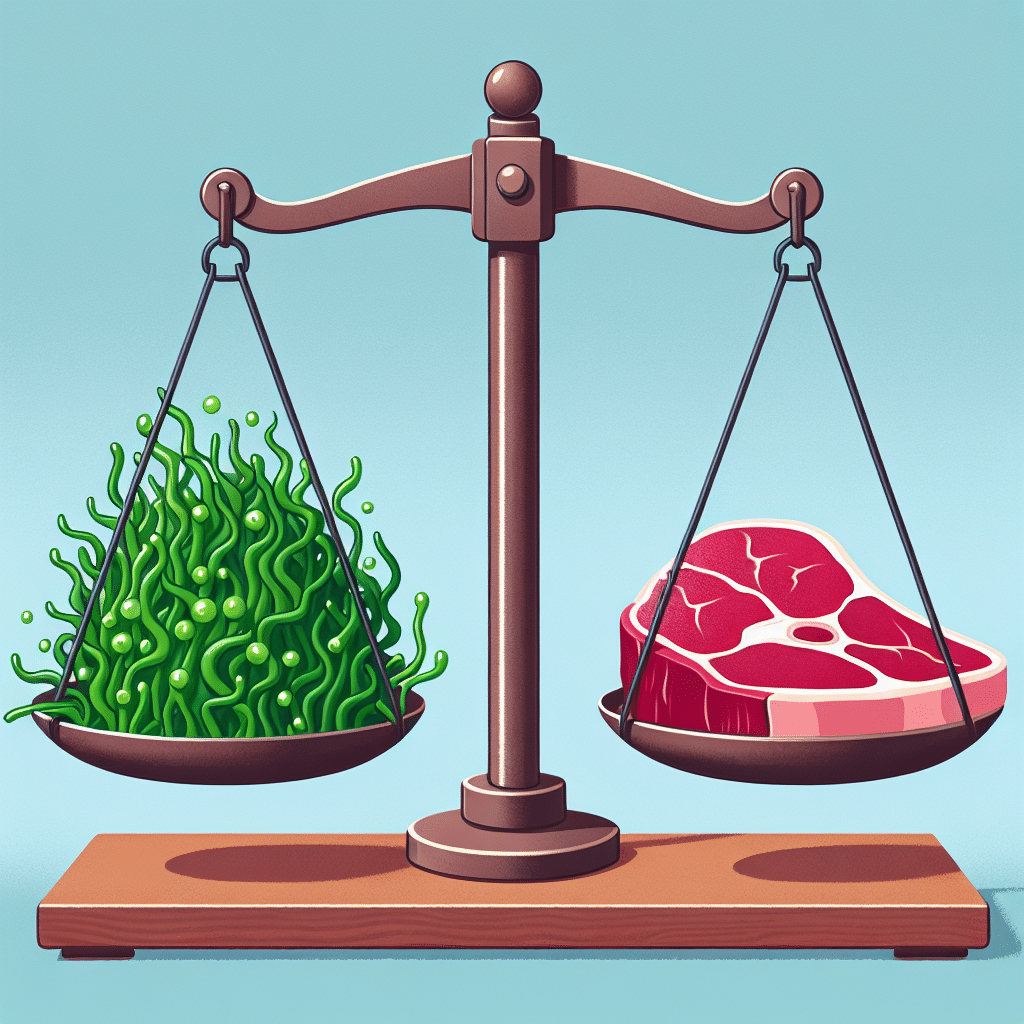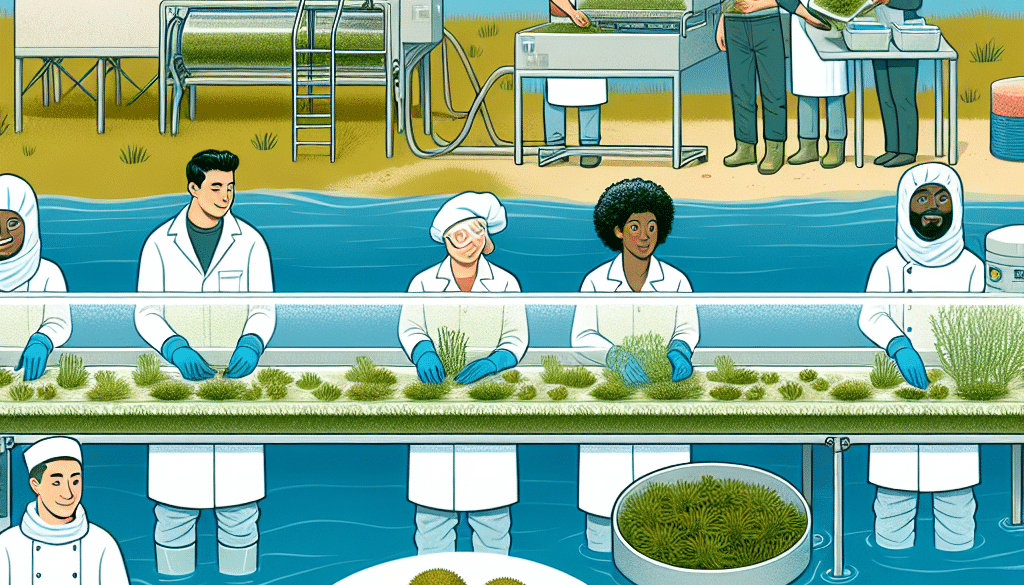Can Algae Replace Meat?
-
Table of Contents
- Algae as a Sustainable Meat Alternative: Exploring the Possibilities
- The Nutritional Profile of Algae
- Environmental Advantages of Algae Farming
- Challenges in Algae Production and Consumption
- Case Studies and Examples of Algae-Based Products
- Statistics on Meat Consumption and Algae’s Potential Impact
- Conclusion: The Future of Algae as a Meat Substitute
- Discover ETprotein’s High-Quality Protein Products
Algae as a Sustainable Meat Alternative: Exploring the Possibilities

The quest for sustainable food sources is more pressing than ever as the global population continues to grow and the environmental impact of traditional meat production becomes increasingly evident. One promising solution that has emerged is the use of algae as an alternative protein source. This article delves into the potential of algae to replace meat, examining its nutritional benefits, environmental impact, and the challenges it faces in becoming a mainstream food source.
The Nutritional Profile of Algae
Algae, a diverse group of aquatic organisms, have been consumed by humans for centuries. They are rich in proteins, vitamins, minerals, and antioxidants, making them a highly nutritious food source. The protein content in certain algae species, such as spirulina and chlorella, can rival that of traditional meats, providing all the essential amino acids required by the human body.
- Spirulina: Often referred to as a superfood, spirulina contains about 60-70% protein by dry weight, which is comparable to beef and chicken.
- Chlorella: This green algae is not only high in protein (about 50-60% by dry weight) but also rich in omega-3 fatty acids, which are beneficial for heart health.
Moreover, algae are a source of unique bioactive compounds that can have health-promoting effects, such as phycocyanin in spirulina, which has been shown to have antioxidant and anti-inflammatory properties.
Environmental Advantages of Algae Farming
Algae farming presents several environmental benefits over traditional livestock farming. It requires less land, water, and energy and produces fewer greenhouse gases.
- Land Use: Algae can be cultivated in ponds or bioreactors, which take up a fraction of the space needed for livestock.
- Water Use: Algae cultivation is highly water-efficient, with systems that recycle water and require significantly less than what is needed for meat production.
- Greenhouse Gas Emissions: Algae growth does not produce methane, a potent greenhouse gas associated with cattle farming.
- Energy Efficiency: Algae grow rapidly and can be harvested year-round, leading to higher yields with less energy input compared to traditional farming.
These factors make algae a sustainable alternative to meat, with the potential to significantly reduce the environmental footprint of our diets.
Challenges in Algae Production and Consumption
Despite its benefits, several challenges must be addressed to make algae a viable meat substitute on a global scale.
- Scaling Up Production: While algae can be grown efficiently, scaling up to meet global demand is a complex process that requires significant investment and technological advancements.
- Consumer Acceptance: Algae are not yet widely accepted as a food source in many cultures, and there may be resistance to adopting it as a staple in place of traditional meats.
- Flavor and Texture: The unique taste and texture of algae can be off-putting to some consumers, and food scientists are working on ways to make algae-based products more palatable.
- Regulatory Hurdles: As with any new food source, there are regulatory barriers that must be navigated to ensure the safety and quality of algae products.
Overcoming these challenges will be crucial for algae to become a mainstream food source.
Case Studies and Examples of Algae-Based Products
Several companies and research institutions are pioneering the development of algae-based food products. For example:
- Algae-Based Burgers: Companies like Algama are using microalgae to create meat-like patties that offer a sustainable and nutritious alternative to beef.
- Algae Protein Powders: Brands such as ENERGYbits offer spirulina and chlorella tablets and powders that can be added to smoothies or consumed as dietary supplements.
- Algae as Animal Feed: Research has shown that incorporating algae into animal feed can improve the nutritional content of the resulting meat and dairy products.
These examples demonstrate the versatility of algae and its potential to be integrated into our food system in various forms.
Statistics on Meat Consumption and Algae’s Potential Impact
Global meat consumption is on the rise, with significant implications for health and the environment. According to the Food and Agriculture Organization (FAO), the demand for meat is expected to increase by 73% by 2050. Algae, with its high protein content and low environmental footprint, could play a crucial role in meeting this demand sustainably.
Studies suggest that replacing just a portion of meat consumption with algae-based products could lead to substantial reductions in greenhouse gas emissions, water usage, and land degradation. For instance, a shift of 10% of global meat consumption to algae could save billions of cubic meters of water annually.
Conclusion: The Future of Algae as a Meat Substitute
Algae offer a promising solution to the growing need for sustainable protein sources. With its rich nutritional profile and low environmental impact, algae have the potential to supplement or even replace meat in our diets. However, significant challenges in production, consumer acceptance, and regulation must be overcome. As technology advances and awareness grows, algae could become a key player in the future of food.
Discover ETprotein’s High-Quality Protein Products
If you’re interested in exploring alternative protein sources, ETprotein offers a range of high-quality, organic bulk vegan proteins that are perfect for those looking to reduce their meat consumption. Their products, including various plant-based proteins and L-(+)-Ergothioneine, cater to a wide array of industries and dietary needs.
ETprotein’s commitment to non-GMO, allergen-free proteins with high purity levels makes them an excellent choice for anyone seeking sustainable and nutritious alternatives to meat. To learn more about their offerings or to sample their products, reach out to ETprotein today.
About ETprotein:
ETprotein, a reputable protein and L-(+)-Ergothioneine (EGT) Chinese factory manufacturer and supplier, is renowned for producing, stocking, exporting, and delivering the highest quality organic bulk vegan proteins and L-(+)-Ergothioneine. They include Organic rice protein, clear rice protein, pea protein, clear pea protein, watermelon seed protein, pumpkin seed protein, sunflower seed protein, mung bean protein, peanut protein, and L-(+)-Ergothioneine EGT Pharmaceutical grade, L-(+)-Ergothioneine EGT food grade, L-(+)-Ergothioneine EGT cosmetic grade, L-(+)-Ergothioneine EGT reference grade and L-(+)-Ergothioneine EGT standard. Their offerings, characterized by a neutral taste, non-GMO, allergen-free attributes, with L-(+)-Ergothioneine purity over 98%, 99%, cater to a diverse range of industries. They serve nutraceutical, pharmaceutical, cosmeceutical, veterinary, as well as food and beverage finished product distributors, traders, and manufacturers across Europe, USA, Canada, Australia, Thailand, Japan, Korea, Brazil, and Chile, among others.
ETprotein specialization includes exporting and delivering tailor-made protein powder and finished nutritional supplements. Their extensive product range covers sectors like Food and Beverage, Sports Nutrition, Weight Management, Dietary Supplements, Health and Wellness Products, and Infant Formula, ensuring comprehensive solutions to meet all your protein needs.
As a trusted company by leading global food and beverage brands and Fortune 500 companies, ETprotein reinforces China’s reputation in the global arena. For more information or to sample their products, please contact them and email sales(at)ETprotein.com today.














